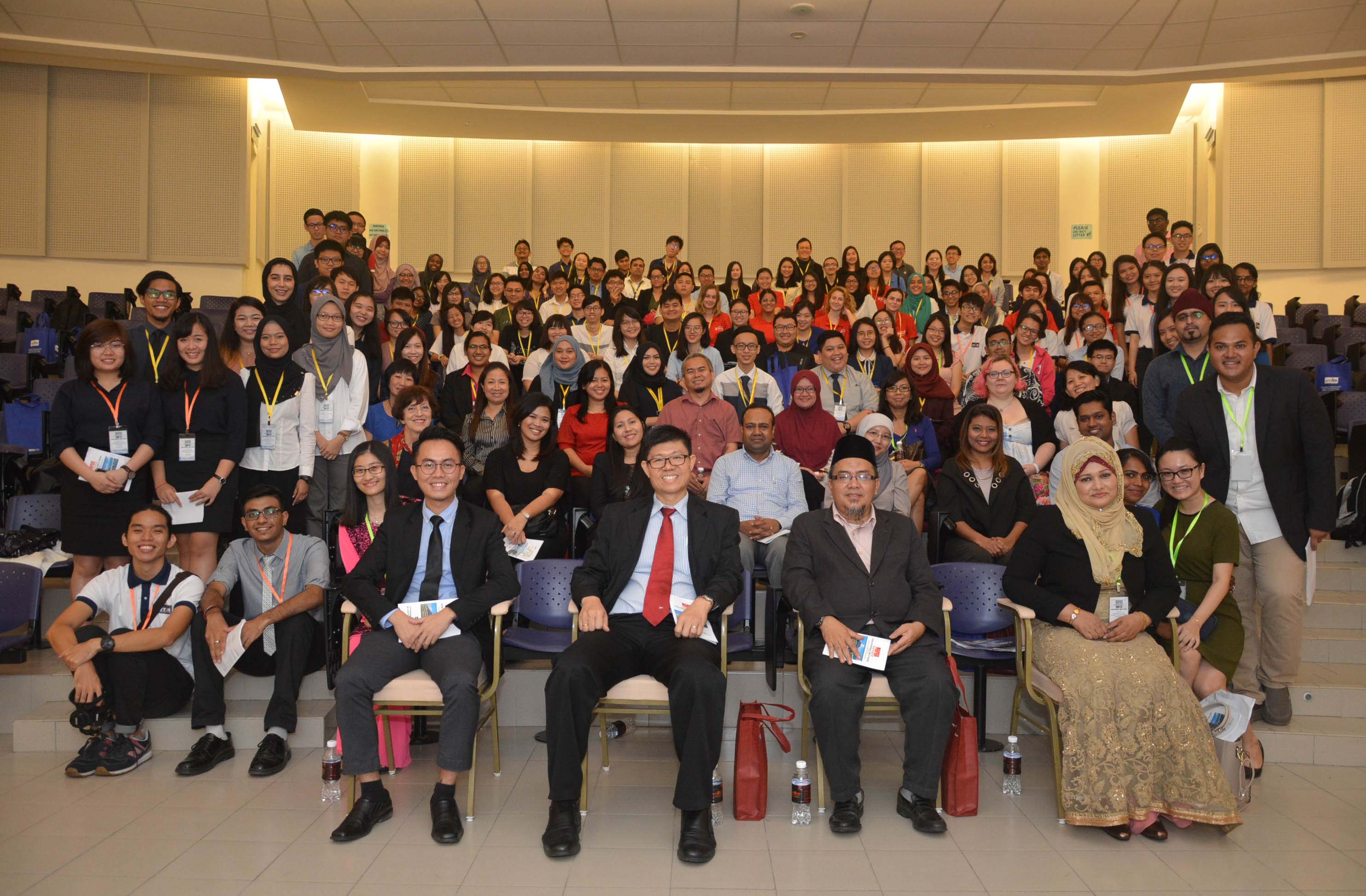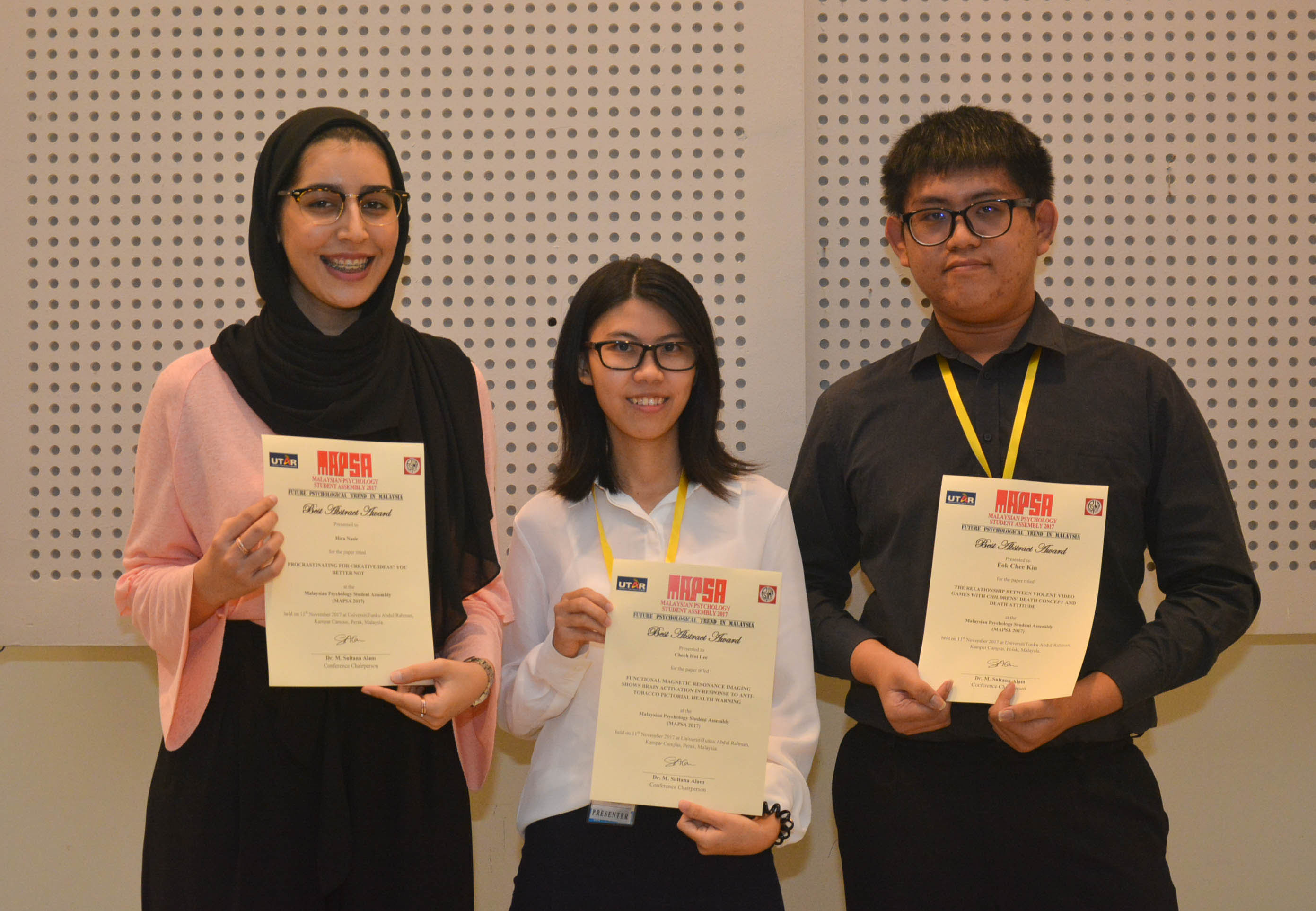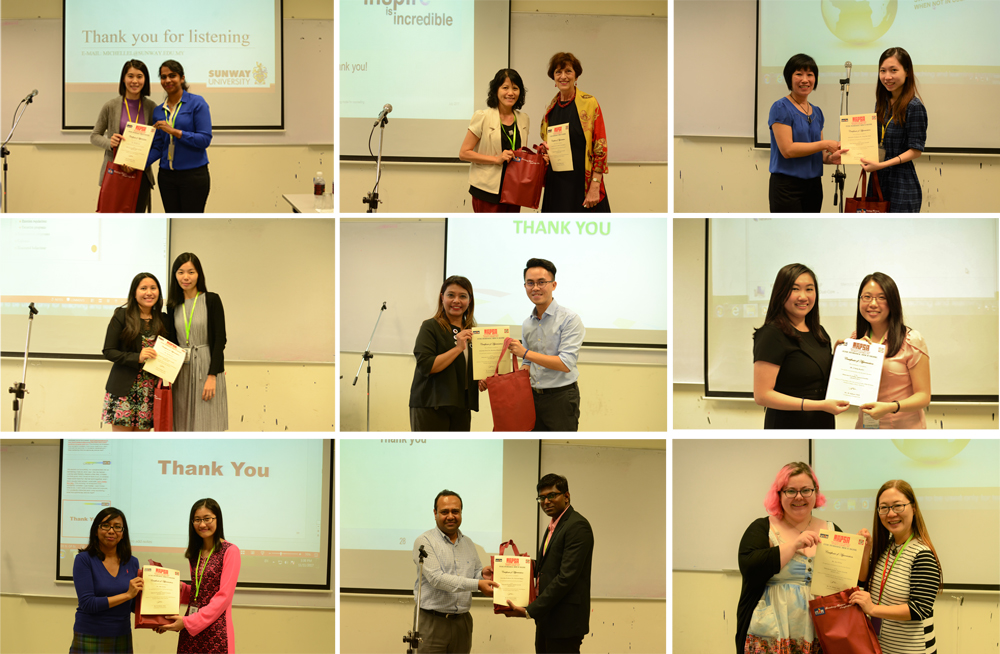

Front row from left, seated: Dr Wider, Prof Choong, Prof Hairul, Dr Sultana with the organising committee and participants
UTAR was the host for the second time at the Malaysian Psychology Student Assembly (MAPSA) 2017, which was co-organised with the Malaysian Psychological Association (PSIMA) on 11 November 2017 at the Kampar Campus.
Themed ‘Future Psychological Trend in Malaysia’, the opening ceremony was officiated by UTAR Vice President for Student Development and Alumni Relations Prof Dr Choong Chee Keong, representing UTAR President Ir Prof Academician Dato’ Dr Chuah Hean Teik. Also present were PSIMA President Prof Dr Hairul Nizam Ismail, Faculty of Arts and Social Science Dean Dr Alia Azalea, Centre for Applied Psychology Chairperson Dr Walton Wider, Organising Chairperson Dr M Sultana Alam, staff and over 200 participants.

From left: Dr Sultana, Prof Hairul and Prof Choong delivering their speeches
“MAPSA is certainly a great opportunity for participants, particularly undergraduate and postgraduate students to discuss psychological trends. It is a platform that enables the students to present their researches, latest ideas and build networks that could lead to research collaboration across various areas,” said Dr Sultana in her opening speech.
Prof Hairul, in his speech, expressed his delight to see various educational institutions offering psychology programmes that will nurture a greater number of psychologist to play important roles in social development.
“I am glad that there are many psychology programmes offered to students these days because, with these programmes, we will be able to meet the society’s increasing demand for psychological services as well as psychological researches that are able to fulfil the need of the society,” said Prof Hairul.
Meanwhile, Prof Choong spoke of the need for many psychological researches in order to understand how to deal better with the human thoughts, feelings and behaviour, which will enable researchers to categorise the psychological disorders.
“Psychological research is vital to help us understand better the symptoms and impact on the individual and society and to understand how relationships, family, peers, school and work affect us; eventually providing opportunities for researchers to develop effective treatments that will improve the quality of life for individuals and the society at large,” said Prof Choong.
He added, “Therefore, we must make great use of the time to discuss, share and express ideas or suggestions at this conference that could lead to synergy of effort, in order to pursue a common result across all areas in the field of psychology; as we all would want a healthy community that is built on sustainable development.”
An award giving session was also held, which saw three students awarded for the best abstracts and they were University Sains Malaysia (USM) student Cheeh Hui Lee, and UTAR Bachelor of Social Science (Hons) Psychology students Hira Nasir and Fook Chee Kin.

From left: Hira, Cheeh and Fook with their certificates for Best Abstract Award
“I am glad to be given this recognition, but I am also happy to have attended this conference because I believe the topics, particularly “Functional Magnetic Resonance Imaging shows Brain Activation in Response to Anti-Tobacco Pictorial Health Warning” will be very helpful for my current research on how neuroscience can be used as an approach in cognitive psychology,” enthused Cheeh.
MAPSA 2017 successfully held three plenary sessions, which consisted of three sub-sessions per each plenary session, where nine esteemed speakers, namely Assoc Prof Gertina J. van Schalkwyk from University of Macao, Assoc Prof Dr Chua Bee Seok from Universiti Malaysia Sabah, Dr Michelle Lee from Sunway University, Dr Ng Siew Li from HELP University, Dr Kai Li Chung from University of Reading, Assoc Prof Dr Rozainee from Universiti Kebangasaan Malaysia (UKM), Assoc Prof Dr Shamsul Haque from Monash University Malaysia, Dr Jess Price from University of Nottingham Malaysia, and Dr Alia, presented their researches.
With Prof J. van Schalkwyk, her “A strength-based approach for school and family counselling” research discussed the broad-based meta-systemic approach in addressing the different interfaces of a child, school and family, which highlighted the importance of school and family counsellors collaborating and facilitating strength-based and solution-focused enabling modalities for vulnerable groups.
Her research also aimed to address the mental health services counsellors could provide for both children and their parents who were experiencing social relationship deficits, as well as the importance of integrating school and family counselling in a coherent system in the interface between clinical and educational settings in the context of Southeast Asia and Malaysia.
In the session on “To Self-Regulate Stress through Neurofeedback Training” Prof Chua described the detrimental effects of work-related stress on the workers, such as causing depression, anxiety, absenteeism and vulnerabilities to work injuries, but assured the participants that there were many approaches that employers and employees can use in creating an environment to reduce stress.
Through her research, participants learnt of the innovative intervention, neurofeedback, which was recently found to show promising results in managing stress and anxiety as well as being beneficial in the management of numerous diseases. Thus, her research was aimed at using the innovative neurofeedback training to help people learn how to regulate their unmanaged emotions caused by stress and to test the efficacy of neurofeedback training in helping people to self-regulate stress. With that, she enlightened the participants that neurofeedback training could stabilise the central nervous system, calm agitation caused by stress, and increase self-control, thereby decreasing feelings of anxiety or anger, and improving self-esteem, concentration and organisational skills.
On the other hand, Dr Lee guided the participants to exploring the important factors from four perspectives: leadership, climate, human resource management and culture, that may influence and interact with the job demands-resources (JD-R) model, while re-looking at the model, which has served as guidance in improving employee work motivation and job performance, through a more comprehensive approach. With it, the research studies the resultant effects on employees; summarising goals and objectives for JD-R researches in the next decade.
Dr Ng drew attention to her “Anxiety Sensitivity and Substance Use” research’s recent finding on anxiety sensitivity and its relation with panic symptoms as well as substance use problems. Her research aimed to examine different proposed models and empirical evidence on the topic of anxiety sensitivity, and to present findings of a study on the relationship between anxiety sensitivity and smoking, which will also take emotion suppression and cultural influence into consideration.
Further benefitting the participants was Dr Kai on his “The Dark Triad” research, which provided the participants with an understanding of both manipulator and victim characteristics as well as the environmental contexts that make social manipulation possible. The research also placed importance to further understand the dynamics of harmful interpersonal behaviours.
In regards to a recent issue on the employability of university students, Prof Rozainee’s research titled “Developing a Success Mindset and the Psychological Attributes necessary for Improving Student Competency” aimed to explore the mindset of university students, by analysing the influence, self-efficacy and achievement motivation on student employability. These factors were also believed to have effects on the competitiveness and marketability of university graduates.
The “Identity and the Formation of Reminiscence Bump: New Findings from Malaysia” research by Prof Shamsul defined reminiscence bump as preferential recall of autobiographical memories from adolescence and early adulthood by middle-aged and elderly people. Findings from the research showed that the bump is made up of periods when people develop their adult identity, acquire dominant personality traits and form social relationships, thus lending support to the identity account of the reminiscence bump.
Dr Price with her research on “The Effects of Multilingual context on the Stroop Task” gave the participants insights to how language context (monolingual context: English, Bahasa Malaysia or Mandarin and mixed context) impacts multilingual speakers, while “Does your organisational culture condone sexual harassment?” research by Dr Alia addresses questions on the causes of sexual harassment, the signs, culture and environments that play a part in condoning, and the law that regulates such misconduct.
“It is exciting to have participated in the conference for the second time because the papers presented were very informative, which also provided me with some ideas for a new research. I also find the topic “Ego Identity, Social Support and Social Anxiety among Homosexual Males in Penang, Malaysia” interesting and as a better way to understand more on this issue,” said DISTED College student Naaga Abirami Nachiar.

Organising committee presenting a token of appreciation to the keynote
speakers
First row
from left: Dr Lee, Prof J. van Schalkwyk and Prof Chua
Second row from left: Dr Ng, Prof Rozainee and Dr Kai
Third row from left: Dr Alia, Prof Shamsul and Dr Price
Apart from the three plenary sessions, two parallel sessions were also held, with each consisting of seven sub-sessions, which provided an insightful arena for the participants to learn on topics, such as Industrial and Organisational Psychology; Special Needs and Refugees; Counselling, Mental Health and Clinical; Health Psychology – Stress and Depression; Healthy Psychology – Undergraduate students; Cognitive Psychology, Neuroscience and Biological Psychology; Cyberpsychology and Delinquents; Educational Psychology; Social Psychology; Parenting Styles, Family and Peers; and Psychometric and Personality.
MAPSA 2017 was organised in partnership with HELP University, USM, Sunway University, International Medical University (IMU) Malaysia, Perdana University, Monash University Malaysia, International Islamic University Malaysia, University of Reading Malaysia, The University of Nottingham Malaysia, UKM, University Malaysia Sabah (UMS), Universiti Pendidikan Sultan Idris, and UCSI University.
© 2019 UNIVERSITI TUNKU ABDUL RAHMAN DU012(A).
Wholly owned by UTAR Education Foundation Co. No. 578227-M LEGAL STATEMENT TERM OF USAGE PRIVACY NOTICE